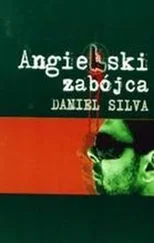Daniel Silva - Prince of fire
Здесь есть возможность читать онлайн «Daniel Silva - Prince of fire» весь текст электронной книги совершенно бесплатно (целиком полную версию без сокращений). В некоторых случаях можно слушать аудио, скачать через торрент в формате fb2 и присутствует краткое содержание. Жанр: Шпионский детектив, на английском языке. Описание произведения, (предисловие) а так же отзывы посетителей доступны на портале библиотеки ЛибКат.
- Название:Prince of fire
- Автор:
- Жанр:
- Год:неизвестен
- ISBN:нет данных
- Рейтинг книги:5 / 5. Голосов: 1
-
Избранное:Добавить в избранное
- Отзывы:
-
Ваша оценка:
- 100
- 1
- 2
- 3
- 4
- 5
Prince of fire: краткое содержание, описание и аннотация
Предлагаем к чтению аннотацию, описание, краткое содержание или предисловие (зависит от того, что написал сам автор книги «Prince of fire»). Если вы не нашли необходимую информацию о книге — напишите в комментариях, мы постараемся отыскать её.
Prince of fire — читать онлайн бесплатно полную книгу (весь текст) целиком
Ниже представлен текст книги, разбитый по страницам. Система сохранения места последней прочитанной страницы, позволяет с удобством читать онлайн бесплатно книгу «Prince of fire», без необходимости каждый раз заново искать на чём Вы остановились. Поставьте закладку, и сможете в любой момент перейти на страницу, на которой закончили чтение.
Интервал:
Закладка:
“So what do I tell them?”
“I recommend staying as close to the truth as possible. We tell them that one of our agents has been abducted by a Palestinian terror cell operating out of Marseilles. We tell them the agent was in Marseilles investigating the bombing of our embassy in Rome. We tell them that we have credible evidence suggesting that Paris is going to be the target of an attack this evening at seven. Who knows? If the French sound the alarm loudly enough, it might force Khaled to postpone or cancel his attack.”
The prime minister looked at Lev. “What’s the status of the rest of the team?”
“Fidelity is out of French territorial waters, and the rest of the team members have all crossed international borders. The only one still on French soil is Gabriel.”
The prime minister punched a button on his telephone console. “Get the French president on the line. And get a translator as well. I don’t want there to be any misunderstandings.”
The President of the French Republic was at that moment meeting with the German chancellor in the ornate Lounge of Portraits in the Elysee Palace. An aide-de-camp slipped quietly into the room and murmured a few words directly into his ear. The French leader could not hide his irritation at being interrupted by a man he loathed.
“Does it have to be now?”
“He says it’s a security matter of the highest priority.”
The president stood and looked down at his guest. “Will you excuse me, Chancellor?”
Tall and elegant in his dark suit, the Frenchman followed his aide into a private anteroom. A moment later the call was routed through.
“Good afternoon, Mr. Prime Minister. I take it this isn’t a social call?”
“No, Mr. President, it isn’t. I’m afraid I have become aware of a grave threat against your country.”
“I assume this threat is terrorist in nature?”
“It is, indeed.”
“How imminent? Weeks? Days?”
“Hours, Mr. President.”
“Hours? Why am I being told of this only now?”
“We’ve just become aware of the threat ourselves.”
“Do you know any operational details?”
“Only the time. We believe a Palestinian terror cell intends to strike at seven this evening. Paris is the most likely target, but we can’t say for certain.”
“Please, Mr. Prime Minister. Tell me everything you know.”
The prime minister spoke for two minutes. When he was finished, the French president said, “Why do I get the sense I’m being told only part of the story?”
“I’m afraid we know only part of the story.”
“Why didn’t you tell us you were pursuing a suspect on French soil?”
“There wasn’t time for a formal consultation, Mr. President. It fell into the category of a hot pursuit.”
“And what about the Italians? Have you informed them that you have a suspect in a bombing that took place on Italian soil?”
“No, Mr. President, we haven’t.”
“What a surprise,” the Frenchman said. “Do you have photographs that might help us identify any of the potential bombers?”
“I’m afraid we do not.”
“I don’t suppose you’d care to send along a photo of your missing agent.”
“Under the circumstances-”
“I thought that would be your answer,” the Frenchman said. “I’m dispatching my ambassador to your office. I’m confident he will receive a full and frank briefing on this entire matter.”
“He will indeed, sir.”
“Something tells me there will be fallout from this affair, but first things first. I’ll be in touch.”
“Good luck, Mr. President.”
The French leader slammed down the phone and looked at his aide. “Convene the Group Napoleon immediately,” he said. “I’ll deal with the chancellor.”
Twenty minutes after hanging up, the president of France was taking his usual seat at the cabinet table in the Salon Murat. Gathered around him were the members of Group Napoleon, a streamlined team of senior intelligence and security officials and cabinet ministers, designed for dealing with imminent threats to the French homeland. Seated directly across the expansive table was the prime minister. Between the two men was an ornate double-faced brass clock. It read 4:35 P.M.
The president opened the meeting with a concise recounting of what he had just learned. There followed several minutes of somewhat heated discussion, for the source of the information, the Israeli prime minister, was a distinctly unpopular man in Paris. In the end, though, every member of the group concluded that the threat was too credible to ignore. “Obviously, gentlemen, we need to increase the threat level and take precautions,” the president said. “How high do we go?”
In the aftermath of al-Qaeda’s attacks on the World Trade Center and the Pentagon, the government of France devised a four-tiered color-coded system similar to that of the United States. On that afternoon the level stood at Orange, the second level, with only Yellow being lower. The third level, Red, would automatically close vast stretches of French airspace and put in place additional security precautions in the transit systems and at French landmarks such as the Louvre and the Eiffel Tower. The highest level, Scarlet, would virtually shut down the country, including its water supply and power grid. No member of Group Napoleon was prepared to do that based on a warning from the Israelis. “The target of the attack is likely to be Israeli or Jewish in nature,” said the interior minister. “Even if it’s on the scale of Rome, it doesn’t justify increasing the level to Scarlet.”
“I concur,” the president said. “We’ll raise it to Red.”
Five minutes later, when the meeting of Group Napoleon adjourned, the French interior minister strode out of the Salon Murat to face the cameras and the microphones. “Ladies and gentlemen,” he began, his facial expression grave, “the government of France has received what it believes is credible evidence of a pending terrorist attack against Paris this evening…”
The apartment house was on the rue de Saules, in the quiet northern end of Montmartre, several streets away from the tourist morass around Sacre-Coeur. The flat was small but comfortable, a perfect pied-a-terre for those occasions when work or romantic pursuits brought Paul Martineau from Provence to the capital. After arriving in Paris, he’d gone to the Luxembourg Quarter to have lunch with a colleague from the Sorbonne. Then it was over to St-Germain for a meeting with a prospective publisher for his book on the pre-Roman history of ancient Provence. At 4:45 he was strolling across the quiet courtyard of the building and letting himself into the foyer. Madame Touzet, the concierge, poked her head out of her door as Martineau came inside.
“Bonjour, Professor Martineau.”
Martineau kissed her powdered cheeks and presented her with a bunch of lilies he’d bought from a stall on the rue Caulaincourt. Martineau never came to his Paris flat without bringing a small treat for Madame Touzet.
“For me?” she asked elaborately. “You shouldn’t have, Professor.”
“I couldn’t help myself.”
“How long are you in Paris?”
“Only for one night.”
“A tragedy! I’ll get your mail.”
She returned a moment later with a stack of cards and letters, neatly bound, as always, with a scented pink ribbon. Martineau went upstairs to his apartment. He switched on the television, turned to Channel 2, then went into the kitchen to make coffee. Over the sound of running water, he heard the familiar voice of the French Interior minister. He shut off the tap and went calmly into the sitting room. He remained there, standing frozen before the television screen, for the next ten minutes.
Читать дальшеИнтервал:
Закладка:
Похожие книги на «Prince of fire»
Представляем Вашему вниманию похожие книги на «Prince of fire» списком для выбора. Мы отобрали схожую по названию и смыслу литературу в надежде предоставить читателям больше вариантов отыскать новые, интересные, ещё непрочитанные произведения.
Обсуждение, отзывы о книге «Prince of fire» и просто собственные мнения читателей. Оставьте ваши комментарии, напишите, что Вы думаете о произведении, его смысле или главных героях. Укажите что конкретно понравилось, а что нет, и почему Вы так считаете.











